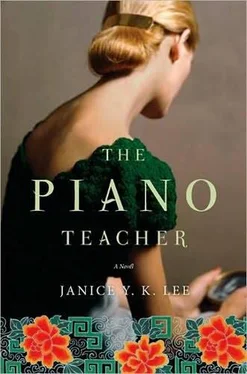He does not remember what it is like to smell fresh air. Instead, urine, feces, the thick, cloying smell of human waste, clings to the very insides of his nostrils. His skin, his hair, his fingers, they are all infused with the smell of shit, no matter how hard he washes. His hands have known the slick inside of a toilet bowl, trying to get the foul mixture of vomit, urine, and shit to flush through its own thickness. The drainage systems are no match for five hundred rapidly sickening refugees-and that is what they are, regardless of whether they were bankers or barristers before-fed with pest-ridden rice and tainted water. The guards are cruel, save one. He is a young boy dressed in a soldier’s uniform with a wide, placid face, and he smiles constantly, apologetically. He turns down his eyes when his colleagues hit the prisoners or poke at them with their bayonets. He speaks a halting English, but only when there are none of his compatriots nearby.
Trudy never comes, although others’ loved ones find a way to come, leave messages. He finds himself mentioning her to everyone, including her in the conversations, as if the mere incantation of her name will keep her real, keep her alive. Her jasmine scent becomes further and further away, a mere memory; the olfactory sense doesn’t keep well. He shifts constantly in bed, unused to the tight, narrow quarters of a space without a companion, her slight warmth. He is not angry with her, yet. Who knows what is going on outside.
Ned is going mad. The young soldier is far from home, far from any love or comfort he might know, and he has stopped talking and eats very little. His face is wan and swollen. Will tries to get him to move around a bit every day but he withdraws a little more every day.
And yet for most, life settles down amazingly quickly. Human beings tend toward routine. It is as if they have been displaced refugees for months, although it has only been a week. Businessmen shuffle around with undershirts falling out of their trousers, their natty suits packed away. Socialites do the wash alongside schoolteachers and shop proprietors. A black market springs up. As some have a lot of money, Arbogast and Trotter arrange a fund so that everyone will get some food. People contribute what they want and then they arrange to buy Russian black bread for six Hong Kong dollars a half-pound, powdered milk, soybeans, carrots, sometimes butter, which they spread sparingly on their bread and eat slowly, savoring the precious fat in their mouths. Young Chinese boys smuggle in the food, but must get past the Japanese guards, who know what’s going on, but take what they want from the meager supplies. “Tax,” says one every time, laughing at his inane joke. That guard takes almost half.
“I do think,” Trotter’s wife says fretfully to Will, “that it is so spread out that no one gets to enjoy it. Don’t you think it would be a better idea to have a lottery of some sort so that one person could enjoy a full stomach for once?”
Will shrugs. He’s not about to get into it with her. He does note, though, that she is as plump as ever. Some women volunteer to do the cooking-one is Mary, the woman with Tobias, the mute child, who hasn’t seen her husband. She is sweet and quiet, and does not take the opportunity of being in the kitchen to take more food for herself and her son, although Will would not have blamed her if she had. The cook girls, as they call themselves, come up with startling dishes: broccoli black bread sandwiches with oyster sauce, watered-down condensed milk stews with plums bobbing about, eggy greens. They have managed to get a cooker from the outside, and in the evenings, they huddle around the blue flame, where their dinner is cooking.
Surprisingly, it settles into normal. If they steer clear of the guards, they are generally left alone, as the guards are too busy drinking and finding women or things to steal. There are always rumors about where they are to be relocated. Some think they will be repatriated immediately. Others, more realistic, hope for a more comfortable place to wait out the war. But they too think it will be over in a matter of weeks or days.
FINALLY, after two and a half weeks, the order comes. Dr. Selwyn-Clarke, the director of Medical Services, has persuaded the Japanese to move the civilians to the empty Stanley Prison on the southern tip of the island, where he believes the fresh air and proximity to the ocean will lessen the outbreak of infectious diseases. Excited, the women gather their belongings and make the beds, filthy as they are-habits die hard even in wartime. Men try to get more information from the guards and are rebuffed. Will gets Ned out of bed and makes sure he is counted.
Lined up outside the hotel, they are packed into large lorries that rumble into life and the children peek through the slats in the back and shout as they pass various landmarks. The children have come to be a blessing, although it is hard on them. They make games out of nothing, play jacks with pebbles, and run around shrieking. Women sit on their bags in the back of the lorry, flesh trembling with the uneven road, society matrons looking as haggard as the governesses and nurses next to them.
Soon, buildings give way to trees as they drive through Aberdeen and into the South Side, where the sea meets the mountains and a lone winding road takes them to Stanley Peninsula. It is quiet here, and seemingly untouched by the violence of the past few weeks.
The vehicles drive through a large gate and into a compound with squat three-story concrete buildings, hastily spray-painted with large A, B, C marks. Soldiers jerk their guns to indicate that everyone should disembark. They are grouped by nationality, lined up to be counted and registered-name, age, nationality, family or single, etc.-an exercise that will grow all too numbingly familiar over the coming weeks and months.
The total: 60 Dutch; 290 Americans; 2,325 British; the rest odds and ends-Belgians, White Russians, foreign wives, even Akiko Maartens, a Japanese woman who married a Dutchman and refuses to leave him for the outside. The guards spit at her and leer, knowing she’s one of them, saying what Will can only assume are outrageous vulgarities, but she ignores them as she waits in line with her husband for their room assignment. She never speaks a word of Japanese, but her bowing and mannerisms give her away immediately. All the enemy nationals have been assembled at Stanley for internment. Will sees faces from that day at the Murray Parade Ground. Everyone says to one another, “I heard you were dead,” smiling and relieved that they are not. Will spots Mary Winkle, the smaller partner of Edwina Storch, looking bewildered. Her constant companion seems not to be with her. The Americans and Dutch have been sequestered in different hotels from the British, the Belgians in their consular office since they are so few in number. From what Will can glean from hurried asides, their experience has been much the same: they are all dirty and hungry. He asks after Dick Gubbins, the American businessman he saw at the Gloucester, and no one has heard anything about him. Hopefully he’s made it across the border into free China.
The Americans have somehow been assigned the best building and, as they are dispatched to their new home, pull together rapidly to organize everything to a fault, arranging to have furniture delivered, sorting out rooming and distribution of supplies, building a store. They are cheerful and productive, as if at a picnic. They seem to have already gotten a government of sorts running, from when they were in the hotels. The first evening, they are seen sitting outside in the twilight, in languorous poses on makeshift chairs, laughing, talking, drinking glasses of weak tea made from smuggled-in tea bags.
Читать дальше












